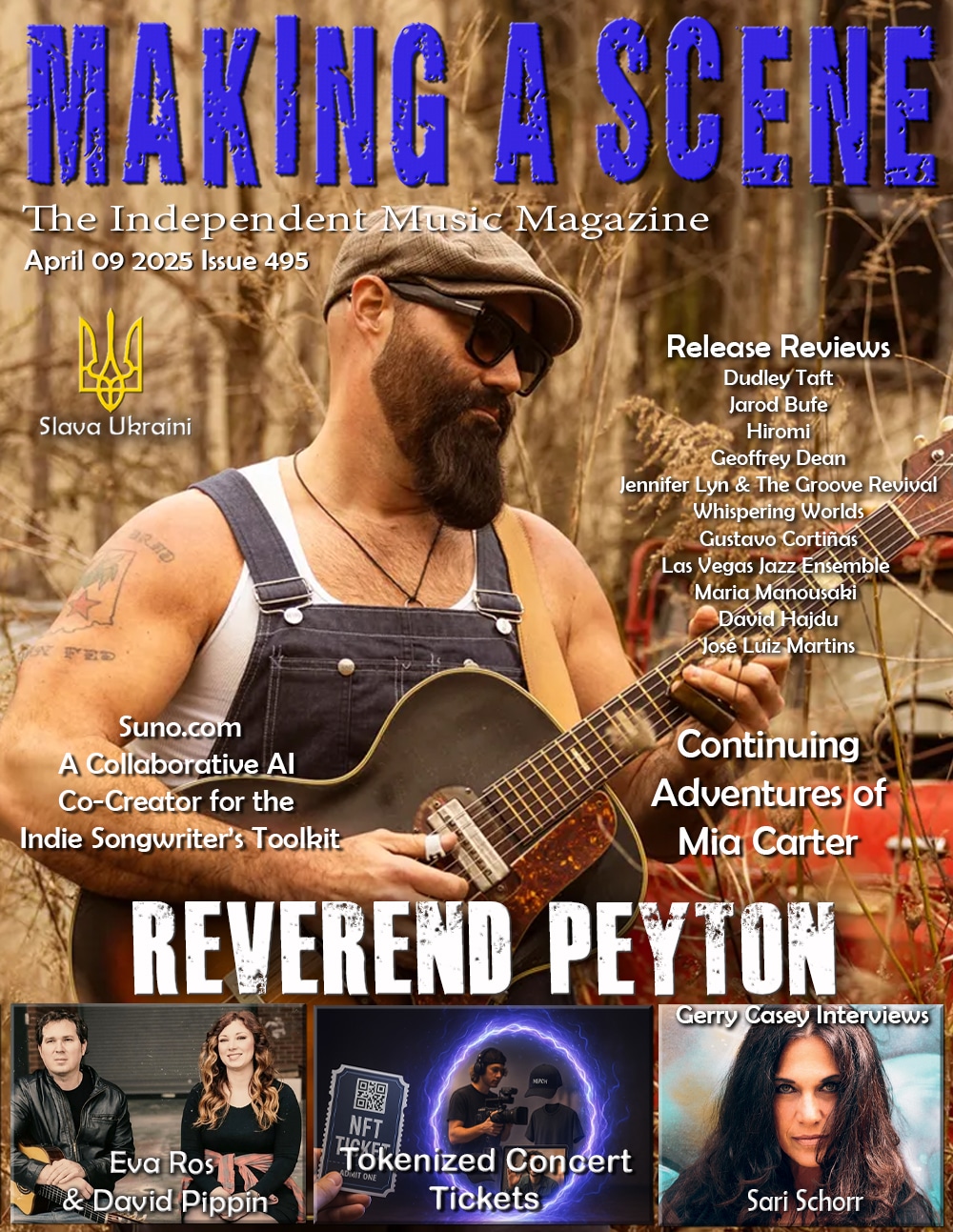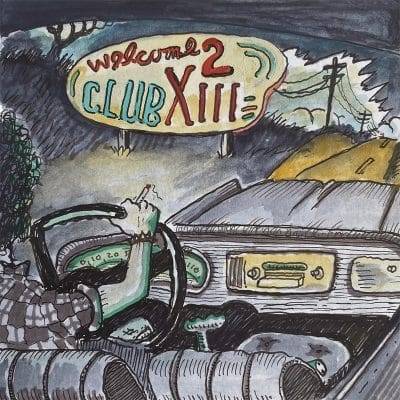Drive-by Truckers Welcome 2 Club XIII
Welcome 2 Club XIII
ATO
America’s preeminent rock band, The Drive-by Truckers, deliver a different, more personal, and nostalgic album with Welcome 2 Club XIII, a major departure from the politically charged The Unraveling and the New OK from 2020. The album takes its name from the Muscle Shoals honky-tonk where founding members and co-leaders Patterson Hood and Mike Cooley (who have been playing together for 37 years now) got their start on a concrete floor dive with disco lights, penny beer, and godawful cover bands, which had more appeal to the club goers than Hood and Cooley’s Adam’s House Cat. As Hood says, “From time to time the owner would throw us a Wednesday night or let us open for a hair-metal band we were a terrible fit for, and everyone would hang out outside until we were done playing. It wasn’t very funny at the time, but it’s funny to us now.” The album looks back at these years with both deadpan humor and the fondness we often attach to our unbridled, oft mistakenly adventurous youth. The imagery and the character portraits are vivid, as one would expect from these two great songwriters. The music rocks, but relative to most DBT efforts, is more controlled. In fact, at times, it plays like one continuous story with few changes in tempo.
This is the band’s 14th studio album and comes from their longest tenured lineup of drummer Brad Morgan, bassist Matt Patton, and keyboardist/guitarist Jay Gonzalez. The album is almost unintentional, borne from rehearsals and jamming when the full band convened in Athens after the pandemic shut down before embarking on a tour in late summer of 2021. Hood and Cooley obviously had some new songs and as the band demoed those and other new ideas, an album took shape in a matter of days, with most tracks cut in just one or two takes. Subsequently they added some guest spots, harmonica from Jeremy Ivey, horns on one track and background vocals from Margo Price, R.E. M.’s Mike Mills, and Mississippi-bred singer/songwriter Shaefer Llana. Long-time producer David Barbe is at the helm with some mixing assistance from Matt Ross-Spang.
One of the pleasures of any DBT album is Patterson Hood’s liners notes. This passage sets up the first track, “Driver.” “Sometimes late at night, I would just get in my car and go out driving., Back roads, county roads, the roads that wound past the closed down factories and bad side of town. I’d play music loud, drink beer, and think. Sometimes I’d have moments of clarity and see a pathway forward. Many of my life’s defining moments came from these late-night drives.” The autobiographical tune opens the album, as heavy power chords introduce a seven-minute-long epic narrative, filled with thunderous windmill-like riffs and Llana’s harmony to Hood’s half spoken, half sung lyrics contrasting those early days to the first initial cross country touring of the DBTs – “…That Grand Prix we saw head-on, on our way to see Replacements/When I hydroplaned but caught the road in time/That guy on I-10 driving east as we were west-bound/In Florida 2000/ April-Nine? That ten degree decline headed down Teton Pass/Cooley driving, snow on solid ice/That meteor that feel beside our bus in Idaho/As we drove on past a near flaming demise…” The earlier passages are arguably a bit weirder – passing by a Klan rally and seeing a carload of girls fly off the highway.
Cooley penned just two of the nine, taking a less nostalgic route but delivering an autobiographical tune just the same with “Every Single Storied Flameout,” featuring the three-piece horn section of Randall Bramlett (tenor sax), Tom Ryan (trumpet), and J.R. Beckwith (trombone). Cooley wrote the son when his son was sixteen and going through a rough period. Coley makes some references to his own youth but offers a bit of hard-earned wisdom along the way – “That part of you that feels alive is wired and can’t be severed from the damage-seeking part of you that runs it/Just don’t embrace it with a vengeance before you’ve even shave with a razor you bought with your own money.” Now you really didn’t think a DBT album would be totally free of politics, right? Yes, Cooley’s other tune, “Maria’s Awful Disclosures,” filled with dense sonic dissonance, connects early 19th century anti- immigration propaganda and specifically the anti-Catholic controversial book published in 1836 with QAnon conspiracy theories of today.
Hood follows that one with “Shake and Pine,” a mellow reflection on how comforts and things we take for granted can slip away as we grow older. Guitars are twangy and keys are soft here as in many places that bely the way-too-simple reputation of these loud rockers. The tone grows darker with “We Will Never Wake You Up in the Morning” about a friend who succumbed to substance abuse with Gonzalez adding just the right mournful touch on the pedal steel. Set in the middle of the sequence is the funny, rather unsentimental title track, with descriptions form this first paragraph and lines such as “girls warmed up by tanning beds” and “When we come this way again/ “Notify our next of kin”/We’ll smell of weed and gasoline/Welcome 2 Club XIII.”
While the aforementioned lacked any semblance of sentimentality, “Forged in Hell and Heaven Sent” is bursting all over with it as Hood recalls a friend from those hellraising days, now celebrating and being grateful they both made it through to be husbands and fathers. Hood gets help from Margo Price on harmonies, Ivey on Harmonica, Scott Danborn on fiddle. He extends his empathy to “Billy Ringo in the Dark,” about another friend who was not as fortunate. The name “Billy Ringo” should be familiar to those who listened to Hood’s terrific 2012 solo album, Heat Lightning Rumbles in the Distance, where Ringo is more of a comic figure in “Better Than the Truth.” The album ends rather gently too, as Hood casts some doubts on the benefits of maturity, expressed best in this verse – “As the sun gets dizzy watching us as we go spinning around/I find it best to laugh at the absurdity of life above the ground/There’s no comfort in survival, but it’s still the best option I’ve found.”
As Hood reflects in the liners, his and Cooley’s kids are approaching the age where Cooley and he met. The DBTs are arguably stronger than ever, 26 years on. The pandemic and loss affected much of the writing from our best songwriters, and these are two of the best. It’s suitably dark and takes on a very different emotional tone than earlier works such as 2004’s The Dirty South or even 2014’s English Oceans. Chalk it up to both the pandemic and that maturity that Hood rails against. True to their mantra, the DBTs still remain provocatively expressive.
- Jim Hynes
Buy Us a Cup of Coffee!
Join the movement in supporting Making a Scene, the premier independent resource for both emerging musicians and the dedicated fans who champion them.
We showcase this vibrant community that celebrates the raw talent and creative spirit driving the music industry forward. From insightful articles and in-depth interviews to exclusive content and insider tips, Making a Scene empowers artists to thrive and fans to discover their next favorite sound.
Together, let’s amplify the voices of independent musicians and forge unforgettable connections through the power of music
Make a one-time donation
Make a monthly donation
Make a yearly donation
Buy us a cup of Coffee!
Or enter a custom amount
Your contribution is appreciated.
Your contribution is appreciated.
Your contribution is appreciated.
DonateDonate monthlyDonate yearlyYou can donate directly through Paypal!
Subscribe to Our Newsletter
Discover more from Making A Scene!
Subscribe to get the latest posts sent to your email.














































